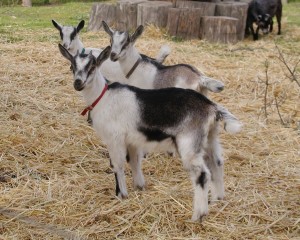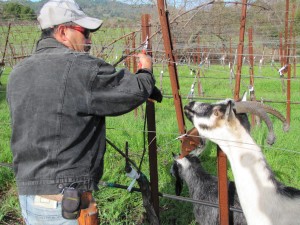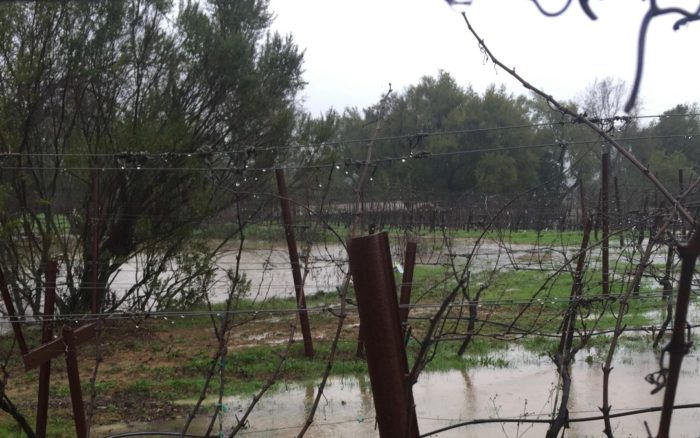When the Earth Turns to Water and Goats Die
Last week our goat Gaviota died. She had sustained a deep puncture wound in October that became infected with an antibiotic-resistant e-coli strain. We went through a regiment of cleansing and packing the wound with Manuka honey laced with lavender, cinnamon, and oregano essential oils, all which have been shown to make the particular e-coli strain more receptive to the broad spectrum antibiotic that she was also receiving. But the wound was deep into her sternum, and bone infections in goats are very, very difficult to treat, as University of Davis Veterinary Medicine informed us from the beginning.
For several weeks it seemed she was holding her own or improving. Every other day we flushed the wound and changed the bandage; every five days she got the antibiotic shot. Then two weeks ago tomorrow I let her walk with the goats down our driveway, and she ran back. After that she didn’t want to walk at all. Our vet Vanessa suggested that she could just be sore, recovering from the run. Let her walk a little, but not too much. But within a couple of days it was clear: she was failing.
Yes, I went through those stages of grief: first, the buffering fantasy that this was a healing crisis. But denial slowly relinquished the hard facts of the situation. Even Rafaela, the animal communicator whom we have worked with for years, said, Gaviota is a very, very sick goat. She asked Gaviota, Do you need help passing? Gaviota told her: Give me a week.
Denial again: I thought she meant give her a week for the tide to turn. Ramon dreamed that our last pygmy goat Ana, who died last March, returned, lost, but not dead. This shook my denial. Something in me knew death was imminent.
Last Friday she no longer stood up, and her breathing was labored. I remembered Rafaela’s statement: if you ask, you need to respect the answer: Give me a week. I swam in the delimma: was delaying euthanizing her cruel, letting her suffer? or were we only taking a natural dying process into our own hands?
I sat alone in my studio, meditating. Having the companionship of our animals is a great responsibility. I believe in the death process, in letting the soul separate from the body at its own pace. I believe in this process for humans and I believe in it for our animals. I threw the I Ching, asking the impact of telling Gaviota it is time now for you to have help; it is okay to go. I got “Gradual Development” moving to “Well spring”. Sitting there alone, I knew: it is time to call Vanessa.
As we waited, Gaviota wretched, laid her head on my lap, and groaned over and over. Occasionally she stopped breathing. “It is okay to go,” I reassured her. When we moved her so we could work with her, Gaviota died. Her face was only inches from mine. Our eyes locked as hers grew large and shocked in pain and/or awe, and then, in that gaze, she disappeared. But that locked gaze pulled me with her— into the watery realms of death.
It rained hard all night, and all the next day. Dawn and evening were the same as midday, and the earth seeped with rain while the sky wept moisture. Gaviota’s grave was liquified, perhaps what alchemists call solutio. There was nothing to do all weekend but make soup and remember that little goat we picked up from an organic Peruvian goat dairy in Pope Valley— eight years ago now, her horns then only stubs. She was one of three: Agaleah, Lily, and Gaviota, but she was the one who warmed up the quickest, always wanting to walk right next to me, kind of like nine year old girls do. We bottle fed them goat milk until they were five months old, perhaps excessive, some suggested, but the goat milk built not only strong bones but also strong bonds.
That bond goes into death I know now. I walked a distance with her as she crossed last weekend— and yes, she was right, it took her a week from the day of her last run. The numbness of shock gave way to gratitude as I remembered our many walks, how she always wanted to be right by my side. How she greeted any stranger and loved the open houses at the ranch. Before I turned back, I called to her, “Meet me when it’s my turn.” And I think she will.

Gaviota shortly after joining us with Agaleah and Lily behind.

Gaviota supervising pruning in 2011.
